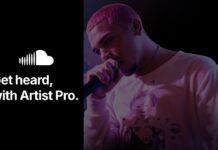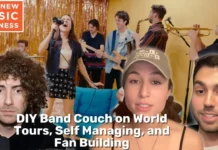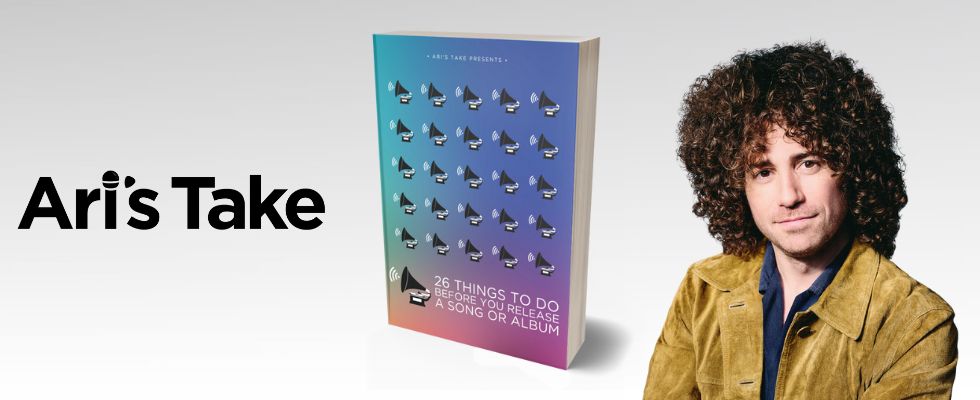Last year I went on two national tours covering 40 states and played over 100 shows. I booked nearly every show. It was my first time visiting about 30 of the cities and many of the other cities' venues I had never played before.
Both tours were financially successful. Let me say that again. Both tours, after expenses, I made money. It blows my mind that musicians tour and lose money. This is totally avoidable, but I hear many musicians just accept this as a reality of the road. Don't. If you want to be a professional musician, you have to figure out how to actually make money with your music. +Double Your (Merch) Income... No Really +Our Tour Page Is Totally Full (Of Empty Shows) First off, though, you shouldn't book a tour until you are successful in your hometown. If you haven't figured out how to get big crowds out to your local shows, then you aren't ready to tour. There are no real "big breaks" anymore. If you're serious about having music as your profession then you need to put in the work and accept that it's a slow game. +How I Got 250 to My Debut CD Release +How I Got To Play The World's Largest Music Festival How did I book the tours? Well, it was hard fucking work, but I made sure I went about it systematically. Timeline Most importantly, you need plenty of time from beginning the booking process until the first show. For a tour containing mostly cities you've never been to before I recommend starting this process at least 5 months out. You should have nearly all of the shows booked 2 months in advance of the first show so you have plenty of time to promote the tour. Most likely you're going to spend the first month routing the cities, researching venues and gaining contact info. Routing Your routing will never be perfect. Meaning, you have to expect you'll do a little bit of backtracking and have a few off days because it's impossible to get every venue's schedule to line up with yours. You want to keep the backtracking and off days to a minimum though, obviously. First, on a map (Google maps works) plot out the cities you want to visit. I try to keep drives shorter than 6 hours on a show day and shorter than 10 hours on a non show day. You're going to spend most of your time on the road, but spreading the long drives out will save you from burnout (and murdering your band members). You also want to plan for about an hour of stops for every 4 hours of driving. The more members you have on tour, the easier splitting up the driving is, but drastically increases your tour expenses. Open a shared calendar in GoogleCal or iCal and share it with everyone on the tour. Put in "held dates" with city names. When you get a "hold" at a venue change that color of the "held date" and title it the city WITH the venue name. When you get a "confirmation" change that color again and title it the city with the venue and in the notes of that event list all details: talent buyer name, email, number, day of contact, venue address, time of show, set length, load in time, door time, set times (for all acts), compensation, hospitality. This will all get confirmed in your confirmation email +What Do You Mean We Don't Get Paid (The Confirmation Email) These held cities will undoubtedly shift so make sure you keep an updated calendar especially if you have multiple members booking. Finding the Venues Once you have the cities you want to visit you have to find the venues that are appropriate for your sound and your draw. If you've never been to this city before it's going to be much more difficult for you to convince the talent buyer (booker) at the venue to give you a night, but it's possible. First you have to decide what kind of rooms you want to play. Are you a mellow singer/songwriter? Seek out art galleries, listening rooms, museums, cultural centers, black box theaters and living rooms. Are you a rock band? Seek out rock clubs, basement venues, frat parties, festivals and block parties. I used Yelp and Indie On The Move for most of my venue research. Yelp is great for audience reviews of the venue and the vibe of the club. Spend time reading these reviews and get a feel for how your project could (or could not) fit in the venue.
+Tour Booking Will Never Be The Same After This Indie On The Move is a newer resource that is specific for bands booking their own tours. They have a great list of venues, contact info and band reviews of the venues. Because they are newer it's not an exhaustive list, but it's very good. The Pitch Most talent buyers at venues work over email, but some still work exclusively over the phone. Remember this and don't be afraid of the phone. +Don't Be Afraid of The Phone Your initial email pitch should be short and to the point. Well, all your emails should be short, but especially the initial one. You don't need to include your finely crafted band bio written by your drummer's girlfriend. The subject line should be the date with all bands you have on the bill. i.e. "oct 23 - pink shoes and tom johnson." Make sure you check the venue's calendar FIRST and make sure that date is open. Also, don't ask for a night that is clearly marked on the calendar as a weekly 80s night or something. You won't get it and you'll piss off the talent buyer because you haven't done your research and it shows you don't care about the club. Keep the email under 8 sentences. Write it in all lower case letters (believe it or not this is how most people in the music industry communicate). Include a link to a live video and a link to your website and/or Facebook. Talk about your history in the area (if any) and explain briefly how you're going to promote it. MOST IMPORTANTLY say how many people you expect to get out for this show. This is what 98% of talent buyers care about. +50 Is The Magic Number (Booking a Headlining tour) Local Openers Most venues will want you to put the bill together, but sometimes they will happily place a proven local act similar to your style on the bill. It's best, though, if you can take a complete bill to the venue. When Myspace was around, it was very easy to find bands similar to your style in any city and quickly listen to them and see what kind of buzz they had. Now that Myspace is virtually extinct, the closest service that can be used for this purpose is ReverbNation. However, 100% of bands are not on this site (contrary to Myspace) so you may have to do a little bit more digging, but it's a good place to start. Consider doing "show trades" in a few cities you've never been to before. Payment Most original music clubs will not offer guarantees. They will give you a cut of the door (most likely after expenses ranging from $50 - $350 for smaller clubs). A typical deal for clubs these days is a 70%-100% cut for 21+ venues, 70-85% for 18+ venues and expect around 50-70% cut for all age venues with most likely higher off the top expenses. You don't have much negotiating power if it's your first time through and aren't proven, so you're going to basically take what you can get. But these are good guidelines to stick to so you know when you should be moving on to another venue in that town. Expect to set (or pitch) your ticket price as what most shows on their calendar are. Meaning, if you contact a club and every show's cover is $15-25, don't expect to charge $6 for your show. Most clubs will allow you to set your cover (within reason). I always recommend up and coming touring acts to set their covers around $10-12. Fans understand that you're on the road and they will pay a little more for touring acts.
+Should You Pay To Play +What Do You Mean We Don't Get Paid? (The Confirmation Email) If you have a large cover repertoire, it's a completely different ballgame. I don't play cover bars so I don't know this circuit, but I know it exists and that you can get guarantees. Most likely they will book their local cover bands first, but you could get lucky. +Free Bird! (Covers vs. Originals)
Promotion You can see why I start this process 5 months out. Once you are about 2 months out you should start promotion. At a bare minimum you should send posters to each venue (ask them how many they'd like). Make sure you budget for this. So, you need to have posters printed up at least 2 months out. Have a blank space at the bottom of the promo poster to fill in the show's details. Promoting shows is another post in it of itself, but make sure you get creative with your promo and make sure you budget for it. If you don't promote the show no one will come. Simple as that. Don't expect the venue to do anything more than including your name in their weekly newspaper ad, listing you on their website and putting up the posters you send them in their club. +How I Got 250 to My Debut CD Release +Shows Sell, Events Sellout Tour Duties Only bring people on the road who are absolutely necessary for your operation to work while still making a profit. Meaning, if you're just starting out, you're probably not going to have the luxury of bringing a tour manager, sound guy, merch manager, photographer, road documentarian (videographer), or lighting tech for a few years. These duties are extremely important and you can't just ignore them because you don't have the people to do these jobs. If you're a solo artist then most likely you're going to have to cover all of these jobs yourself (or find people in each city to help out). If you're in a band, you MUST allocate these duties. +Allocating the Duties +8 Things You're Forgetting To Do On Show Day Merch When you're on tour, merch is your #1 income generator. So if you want your tour to be financially successful, make sure you have lots of merch and a credit card swiper (Square is free and hooks up to an iPhone/Droid). Also, make sure you have someone running your merch every night. If you don't have a merch person on the road with you, then find someone in each city, every night to cover this. +Double Your (Merch) Income... No Really House Shows If you're a singer/songwriter then playing living room, backyard, basement, house concerts should be a part of every tour. All it takes is one fan in a city to be extremely excited about you. Organize the show at their place (typically has to be a weekend) and require a minimum guaranteed payment (I usually set it at $350). Ask them to charge their guests around $15 and explain that if they get enough people in there to cover your minimum payment then they get a free concert. Possibly give them a percentage of the income after the minimum to cover snacks and a reward for hosting it. I've had some of my favorite (and most profitable) shows in people's homes. You don't need to promote these (as it's the host's responsibility) and you'll sell a lot of merch. People love the personal connection. Schedule these on nights where you haven't been able to book a club or in cities where you really don't think you'll have a draw. Colleges Colleges were my bread and butter for awhile. I've played over 70 colleges in the past 5 years. Colleges pay extremely well. I recommend getting a college booking agent, but if you can't then ask around to see if you know anyone at any college who is on the music committee. Once you find that person, pitch them on your price (more on that below) with a video and some accolades. They don't typically route with your schedule (they have dates throughout the semester to fill) and they typically book 6-18 months in advance. Start planning this tour a year out and if you can route AROUND the college shows then you will relieve many of the financial burdens of the tour. Just so you have a frame of reference, most colleges pay an average of $1200 for an unknown singer/songwriter and $1800 for an unknown band for a one hour set and they cover food and lodging and sometimes travel costs. I'll wait while you pick up your jaw and wipe away the drool. +9 Things You Didn't Know About The College Music Market +Want To Learn How To Break Into The College Market? Setup A Consulting Session With Me Lodging So, once the tour is completely routed and confirmed you'll want to start figuring out sleeping arrangements. For your first few tours this will mean finding friends in each city with couches or floor space (invest in an air mattress and sleeping bag). Try to figure this out before the day of the show, but as a last resort you can announce on stage that you're looking for a place to crash that night. More times than not this works. Not very rockstar - but neither is sleeping in your van. Closing If you've made it this far then by god you might be dedicated and serious enough to actually embark on a full tour! If you have a little bit of a budget and want me to help guide you through the next phase of your career or setting up a tour, hit me up (contact below) and we'll setup a Get Specific program.


















